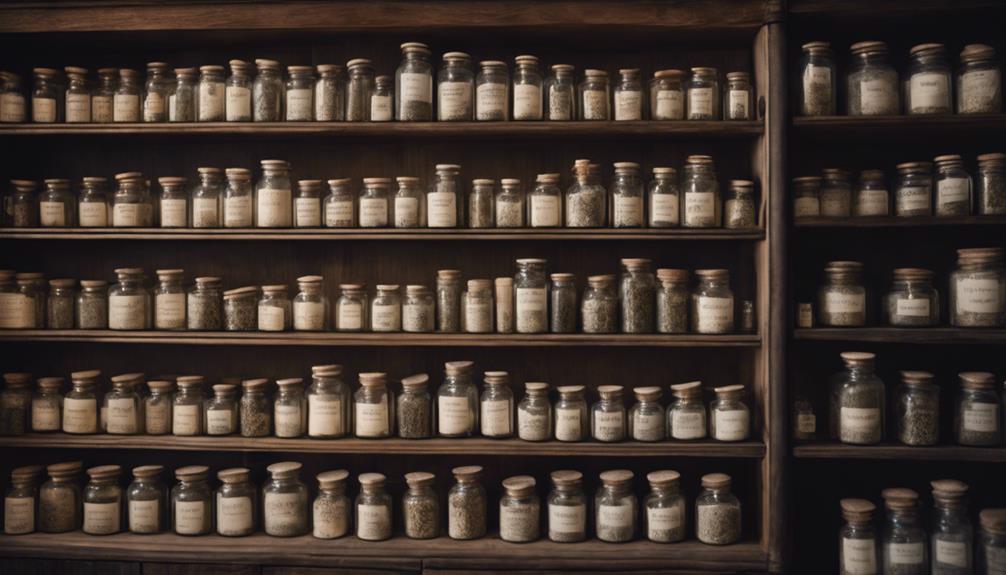In the US, herbalism operates within a complex regulatory framework, governed by federal and state laws, alongside various agencies. Manufacturers, practitioners, and consumers must grasp these regulations to guarantee safety, efficacy, and compliance. The FDA and FTC oversee herbal supplements, monitoring product safety and labeling, while state laws vary in licensure requirements for herbal practitioners. Failure to adhere can result in fines and legal action. With intricate regulations and challenges in standardization, understanding these rules is vital. As the industry continues to grow, navigating these complexities is essential for all stakeholders – and there's more to explore.
Key Takeaways
• Herbal supplements are classified as dietary supplements under federal regulations, with varying state laws for practitioner licensure.
• Manufacturers are responsible for product safety and labeling, with FDA and FTC overseeing compliance with regulations.
• Strict safety and efficacy standards must be met, with clinical trials providing scientific evidence for marketing claims.
• Labels must comply with regulations, with truthful and non-misleading health claims, and scientific evidence required for marketing claims.
• Challenges in regulation include lack of standardization, limited FDA resources, and presence of counterfeit products, making consumer decisions difficult.
Legal Framework for Herbalism
The legal framework for herbalism in the US is shaped by federal regulations. Herbal supplements are classified as dietary supplements at the federal level. State laws also play a significant role, and they vary in their licensure requirements for herbal practitioners.
This complex framework can lead to confusion among herbalists. They must navigate both federal and state regulations to practice legally. For instance, manufacturers are responsible for ensuring the safety and labeling of herbal products. States have varying requirements for licensure. Some states require specific licenses for herbal practitioners, while others have more lenient regulations.
Without a thorough understanding of these regulations, herbalists risk fines and legal action.
Regulatory Agency Oversight

FDA and FTC, the primary regulatory agencies overseeing the herbalism industry, actively monitor and enforce compliance with federal regulations, guaranteeing manufacturers adhere to strict guidelines and consumers receive safe and effective products. They scrutinize labeling, marketing, and manufacturing practices to prevent deceptive claims and uphold product safety.
Here are three key aspects of regulatory agency oversight:
- Product Safety Monitoring: FDA tracks adverse event reports and takes action against misbranded or unsafe products.
- Marketing Regulation: FTC regulates advertising to prevent deceptive marketing claims and ensures marketing claims aren't misleading or unsubstantiated.
- Manufacturing Standards: FDA mandates Good Manufacturing Practices for dietary supplements, ensuring manufacturers maintain high-quality production standards.
Safety and Efficacy Standards

Manufacturers must adhere to stringent safety and efficacy standards, as the FDA monitors adverse event reports and takes action against misbranded or unsafe products.
The FDA mandates Good Manufacturing Practices (GMPs) for dietary supplements, guaranteeing consistency and quality in herbal product manufacturing.
Clinical trials validate the health benefits and safety of herbal products, providing scientific evidence for marketing claims. Successful research can lead to FDA approval for new uses, expanding the scope of herbalism.
Labeling and Marketing Rules

Rigorously, herbal product labels must comply with stringent regulations, ensuring that health claims are truthful and not misleading, and that producers can only make structural or functional claims. This means manufacturers must provide scientific evidence to support their marketing claims, and the FDA closely monitors labeling and marketing of herbal products. Failure to comply can result in legal repercussions and fines.
Here are three key takeaways about labeling and marketing rules for herbal products:
- Truthful and not misleading: Health claims on labels must be accurate and not misleading to consumers.
- Structural or functional claims only: Producers can only make claims about the product's structure or function, not its ability to cure diseases.
- Scientific evidence required: Manufacturers must provide scientific evidence to support their marketing claims, ensuring that claims are substantiated and not deceptive.
Challenges in Regulation

Moreover, Herbalism regulation faces numerous challenges, including a lack of standardized quality and efficacy in herbal products, limited FDA resources for evaluating all products, and the presence of counterfeit or adulterated products that complicate regulation. These challenges lead to inconsistent product quality, making it difficult for consumers to make informed decisions.
Additionally, the FDA's limited resources hinder its ability to effectively monitor and regulate the herbal industry, allowing subpar products to flood the market. As a result, consumers are often left uncertain about the safety and efficacy of herbal products. This lack of trust can have a significant impact on the industry as a whole, making it essential to address these challenges and establish stricter regulations.
Frequently Asked Questions
Can Herbalists Prescribe Herbal Remedies for Medical Conditions?
Herbalists can't prescribe herbal remedies for medical conditions as they aren't licensed medical professionals. While some states require licensure for herbal practitioners, it doesn't extend to prescribing treatments.
According to the FDA, herbal supplements are classified as dietary supplements, not medications, and can't be prescribed for medical conditions. Herbalists can, however, provide guidance on using herbal supplements for general wellness, but not as a substitute for medical treatment.
Are Herbal Supplements Covered Under Health Insurance Plans?
Herbal supplements aren't typically covered under health insurance plans as they're classified as dietary supplements, not prescription medications. The FDA regulates them as food products, not drugs, making them ineligible for insurance coverage.
As the National Institutes of Health states, 'dietary supplements aren't intended to treat, diagnose, cure, or alleviate the symptoms of diseases.' This classification limits consumer access to insurance reimbursement for herbal supplements.
Can Herbal Products Be Patented for Exclusive Production?
As the ancient Greek physician Hippocrates once said, 'Everything in excess is opposed to nature.' Similarly, the pursuit of patenting herbal products for exclusive production raises questions about the limits of innovation in the natural domain.
According to the US Patent and Trademark Office, natural products, including herbal remedies, aren't patentable subject matter under 35 U.S.C. § 101. This means that companies can't patent herbal products in their natural form, but may be able to patent specific formulations or manufacturing processes.
How Do I Report Adverse Reactions to Herbal Supplements?
She reports adverse reactions to herbal supplements by contacting the FDA's MedWatch program online or by calling 1-800-FDA-1088.
The agency encourages consumers to provide detailed information about the product, including its name, manufacturer, and batch number.
Are Online Herbalist Certification Programs Recognized by the State?
She notes that online herbalist certification programs may not be recognized by the state, as state laws vary regarding licensure requirements for herbal practitioners.
While some states require specific licensure, others do not, and online certifications may not meet state standards.
It's crucial to research the specific state's regulations and requirements before pursuing online certification programs to guarantee recognition and legitimacy.
Conclusion
In the wild west of herbalism, where claims of 'all-natural' and 'ancient wisdom' abound, it's ironic that the industry's biggest hurdle is ensuring the very things it promises: safety and efficacy.
With regulatory agencies stretched thin, it's up to practitioners, manufacturers, and consumers to navigate the complex landscape. As the FDA warns, 'just because a product is 'natural' doesn't mean it's safe' (FDA, 2020).
By understanding the intricacies of herbalism regulations, we can decipher fact from fiction and unleash the true potential of this ancient practice.










